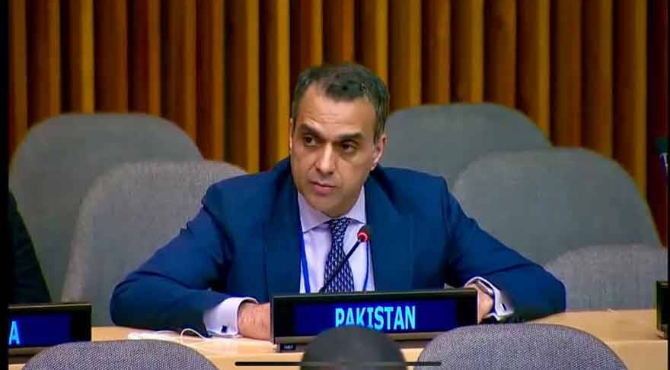ISLAMABAD(National Times)- Noor Mukadam’s convicted killer Zahir Jaffer on Wednesday filed a review petition in the Supreme Court against the top court’s May 20 verdict which upheld his death sentence for gruesome murder of the 27-year-old at his sprawling Islamabad mansion in 2021. A three-member bench, led by Justice Hashim Kakar and comprising Justice Ishtiaq Ibrahim and Justice Ali Baqar Najafi had upheld Jaffer’s death penalty and fine earlier this year. The apex court further reduced the sentences of co-accused i.e., Jaffer’s watchman and gardener and ruled that the punishments already served by both would suffice. The high-profile case had garnered public attention back in 2021 when Jaffer, the son of an industrialist, brutally assaulted and murdered Mukaddam, the daughter of a former ambassador. The victim had made repeated attempts to escape the night she was killed, but was blocked by two members of Jaffer’s household staff. The killer then resorted to torturing her with a knuckleduster and used a “sharp-edged weapon” to behead her. Mukadam had made repeated attempts to escape the night she was killed, but was blocked by two members of Jaffer’s household staff. In February 2022, a district and sessions court sentenced Jaffer to death, alongside a 25-year prison term with hard labour and a fine of Rs200,000, concluding the trial that continued for over four months Almost a year later, in March 2023, the Islamabad High Court upheld Jaffer’s death sentence and upgraded his 25-year sentence to an additional death penalty, on the appeals filed against the punishment awarded to the convicts.
Reliance on video recording, no medical assessment
In the review petition filed by Advocate Muhammad Usman Mirze, Jaffer has argued the prosecution’s reliance on video recordings. The plea argues that the May 20 SC judgment failed to consider the fact that the recordings were not proved during the course of the trial. “Portions of these so-called recordings, on the basis whereof the inference of ‘last seen’ has been drawn against the petitioner, were never played during the trial; rather only hearsay evidence thereof was led by the prosecution at the trial in the form of oral statement. “So far as PFSA’s forensic Report pertaining to the purported video recordings […] the same too is not proved as per the law prevalent at the relevant date and time, as neither the scribe nor the executant (i.e. the concerned Forensic Expert/s) entered the witness box to authenticate the same on oath, rather it was merely produced in his statement by the learned Prosecutor while closing the prosecution evidence. “As such, even the authenticity of the aforesaid video recordings do not stand proved in this case,” the plea contends. The plea stresses that: “Once the video recordings are excluded from consideration because of the lack of proof and authenticity thereof, one of the essential links in the chain of evidence to make out a case of capital punishment against the petitioner on the basis of circumstantial evidence gets severed, and, consequently, the judgment dated 20.05.2025 merits to be reviewed accordingly”. Furthermore, Jaffer’s review plea raises the issue of his mental state and capacity at the time of the incident and argues that the SC’s May 20 verdict “suffers from an error apparent on the face of the record as it has not addressed the issue of unsoundness of mind or mental capacity of the petitioner”. It further highlights that the court had not decided on Jaffer’s petition seeking examination by a medical board. “The record of the trial court shows that the question of the mental capacity of the petitioner to stand trial was never taken or addressed seriously as mandated by this august Court in, inter alia, Safia Bano’s case. “The petitioner was considered a pariah throughout the trial and all manifestations of his mental disorder were presumed to be fake and feigned and, as such, his case relating to mental disorder was never considered with fairness and as required by law, and even no question was put to him within public domain or hearing to ascertain his mental condition so as to make a tentative assessment as to whether he was capable of defending himself at the trial,” it reads.
Zahir Jaffer’s medical examination
It is pertinent to know that the a two-member medical board from Pakistan Institute of Medical Sciences (PIMS) conducted a physical and mental evaluation of the convict at Adiala Jail on Monday, The News reported on Tuesday. The board comprised Dr Amir Naveed from the Neurology Department and Dr Shafqat Nawaz from the Psychiatry Department of PIMS. Jail officials said the examination took place inside Central Jail Rawalpindi and was part of the legal process required before a mercy petition is submitted to the President of Pakistan. Jail authorities said the medical board was constituted upon a formal request from the jail administration to the director of PIMS. The board has been tasked with assessing the convict’s mental and psychological condition and will submit a report that is to be forwarded with the mercy petition to the President. Officials also revealed that Jaffer was mentally sound at the time of his initial incarceration in Adiala Jail and had no history of psychiatric illness. However, after being sentenced to death by the trial court, he remained under treatment at the jail hospital for nearly two months before being declared fit and shifted to the death cell.


















